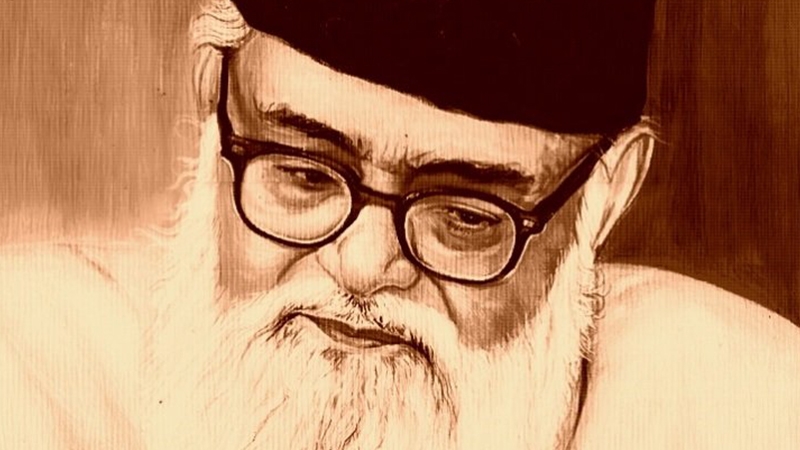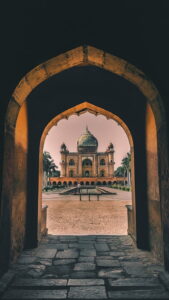
Maulana Abul A’la Maududi is considered as an exceptional Islamic scholar and a reformist whose intellectual and spiritual works are of utmost relevance today. To articulate this point, this article intends to review one of his notable works, Taleemat, (Translated to English as The Education by Prof. S.M.A. Rauf). Taleemat is a collection of Imam Maududi’s articles and speeches of the past thirty years of publishing this work. In the book, he lays out a complete plan to replace the current liberal-secular education system with an Islamic alternative. Throughout history, Muslim Ummah faced several intellectual and physical onslaughts under brutal imperialist and colonial powers who aimed to annihilate Islam, jumbling their own illogical fallacies with the divine revelations was one of their strategies. It was during this critical juncture of time, Maududi unapologetically emphasized that Islam is an absolute and comprehensive way of life, the only system of life in which humans can survive honorably.
In Taleemat, Maulana refers to the degradation of curriculum followed in Islamic institutes in 1930s as a result of godless or secular education, and thus deviation of many youngsters from Islamic path. During that period, serious discussions took place concerning Education Policies of Islamic Universities, particularly in the context of Aligarh Muslim University. Maududi reviewed the recommendations put forth by the committee set up to evaluate this agnostic situation among students and located the main drawbacks and problems in the educational system, which was a crucial step in the reconstruction of Islamic ethical values and the purging of westernized indoctrination from university syllabi. Even in present context, it is inevitable that the questions raised by Imam be analyzed and addressed with due relevance. While there is growing enthusiasm in Conceptualising ‘Muslim Ummah’ that embodies Islamic values, we overlook how less our Muslim youngsters know about Islam and what has entrenched them to various western illusions of isms.
Limitations of secular and traditional Islamic educations
In Surah al-Baqarah (second chapter of the Quran), Allah says: “Enter completely into Islam”. In light of this verse, how could we obey Allah or become a Muslim without replacing the current system and policies with godly ones? In his analysis, Imam Maududi concluded the following: – First, under a godless leadership, only godless ideologies survive, so it is up to pious believers to challenge the system and replace it. Secondly, an educational system limited to traditional learning-followed in most Islamic seminaries or institutes are insufficient for such a revolution. Thirdly, the education system which views every discourse from a single perspective, i.e. through secular-liberal epistemology, assures the way for rejection of revealed truth resulting in apostasy. Fourthly, education reform that combines liberal and Islamic learning cannot bring a revolution in leadership.
A consequence of the combination of Islamic and liberal discourses is evident in the present as a Liberal-Muslim concurrence. As a result of the intellectual degradation happened among Muslims in mid-20th century, several political upheavals occurred. It was then that two streams emerged within the Indian Muslim community – the Traditional reformists and the Modern reformists. Traditional reformists or the Deobandi school of thought; although grasping the perils of the liberal education, lacked Islamic intellectual framework to counter European ideologies hegemonising the modern education system. Maududi identified this to be resulting from their outdated syllabus that did not take into account the secular ideologies to develop its criticism. Modernists on the other hand uncritically adopted the secular education system. Even though some elements within the community adopted reforms, it was largely unsatisfactory to address the challenges of the time. That is why Imam Maududi informed about the need for reconstructing the education system which he carried out with his writings in Tarjumanul-ul-Quran from 1936 to the 1960s in which, Imam evaluated the condition of prevailing education policy. He questioned the methodology of including uncritical study of European ideologies as well as teaching traditional Islamic sciences in Muslim universities that made students susceptible to western thoughts. This was particularly because in the post-Independence period, liberal education was privileged and given credibility in the overall education system of the country.
Plan of Action: a road map
Poised to initiate actions to address the challenges, Maulana shared his suggestions for education policy to the commission setup by some educational reformists in 1936. He emphasized that the Solution does not consist in modifying the syllabus alone, but in restructuring the whole education system. His proposals to the commission mainly consisted of three aspects- A critical evaluation of the present curriculum of the universities, their basic flaws – and recommendations to adopt policy that would include the interests of Muslims. Second aspect was to find remedial measures for the status quo. The final one being for Implementation of these suggestions.
Maududi strongly believed that a mere inclusion of Islamic studies in the syllabus only intensifies the conflict of westernization and Islam inside the young minds. Segregating students inline of their approach, Imam Maududi divides them into three categories: Those that were completely indoctrinated with western thoughts and thus programmed as the devotees of Nationalism and atheistic Socialism. The other category is of those who are inspired by the Islamic philosophies but they remained sidelined or alienated in the society. Finally, those who are neither completely westernized nor completely Islamized.
Islam being a complete system of guidance revealed by Almighty enshrines a vision to implement in all aspects of human life. It is only irrational to reject this divine system and entrust our lives with any synthetic philosophies arising from the confines of Human intellects. Imam Shah Waliullah Dahlavi, in his magnum opus Hujjatullah-al-Balighah, elaborates this universal concept and meaning of Islam. Hence, the primary process for establishing the education system as Imam Maududi said, is cleansing every vestige of secularism (godlessness) – in the realm of culture, art, costume, education, etc. Given the supremacy attributed to liberal arts teaching Islam from traditional Islamic sciences does not contribute to the intellectual growth of Islamic philosophy. Thus it is inevitable to create a system in which Islamic values can flourish.
Mere addition of Islamic jurisprudence or other Islamic sciences as a subject to the existing system won’t bring any substantial changes unless we introduce all knowledge streams, viz, history, geography, zoology, physics, political science, etc. and offer its criticisms with Islamic epistemology. This new envisioned system would not require a separate course for Islamic studies and thus can eradicate the evils of secularism from Muslim Ummah gradually. The modus operandi of Imam Maududi for this specialized education is to establish six departments: philosophy, comparative religion, history, and social sciences, separate departments for natural sciences and religious studies and law.
Imam Maududi writes; Students joining this department should first study the philosophy of the Quran to learn how to probe into the truths of what we perceive through our senses and what is the extent and limitation of the human intellect[i]. A study of comparative religion would enable a student to see where Hindu and Greek philosophers erred, how Muslim philosophers drifted away from Quranic teachings…[ii] He reiterates, there should be a separate department to teach the history of Quranic philosophy as well as the purpose and method of studying history in general. In the department of social sciences students ought to be taught the fundamentals of life with reference to the Quran and the Hadith. In addition, science departments allow students to examine scientific data and conduct further research in the various spheres of human knowledge. In terms of religious studies, a separate department was proposed on the Quran that enables its students to gain a deeper understanding of the holy book. The Department of Law can conduct extensive research on the Quranic teachings, the Prophetic traditions, the interpretation of Islamic Shariah by his companions and immediate successors and the method of deduction and interpretation of minor details of the Islamic code of conduct.[iii] Implementation of this system can save our precious time indulging in non-beneficial discourses imperiling the liberal academia today. Emphasizing the supremacy of Islam and imparting an academic environment with Islamic spiritual aura will mold students to strive in the path of Allah firmly.
Relevance for Modern crisis
Implementation of this program however, has its challenges and practical difficulties. Primary challenge is the absence of teachers and textbooks. As for the texts initially, it was decided to make them available for students at secondary and college levels. To tackle other challenges, Imam proposed his visions at the Education Conference called by the Central council of Jamaat-e-Islami held at Darul Islam, Pathankot, Gurdaspur in 1944. Forty-two members participated in this conference including Jamaat-e-Islami members, its sympathizers, and other visionaries. The whole report of this conference is included in Taleemat along with the proposal of Imam Maududi.[iv] In his proposal, Imam presents the blueprint of his education policy that includes a Primary education for 8 years, Secondary education for 2 years, and Higher education for 4 years. The primary education was designed of three modules: (1) Ethical – moral behaviors for individual and social life is emphasized in this part along with logical thinking and creating a habit of research and curiosity. (2) Practical Training – concentrates on sharpening students’ physical skills and to nurture their leadership qualities. (3) Academic – guidance and training have to be provided in the fields of language, literature, science, history of Islam and Indian history, fundamentals of Islamic faith and culture, modules to develop skills in drawing, map reading, etc. The secondary level was designed of two aspects: (1) General and (2) Special departments. The general category has to include language training, basic training for research on Quran and detailed study of hadith. For the special departments, to focus in depth advanced studies including economics. The Higher Education is also designed of two parameters: (1) Academic Education and (2) Moral Education. In academic education, five different departments were included. Islamic intellectual training for students according to the Quran and hadith is the composition of moral education. Women’s education is not separately emphasized in this article as Imam Maududi had unequivocally stated its significance that it is as important as men’s education. A community cannot progress unless it provides the best education for women, who constitute a vital segment of the society. Even after decades of Maududi’s revolutionary proposal, we are still in the nascent stage of implementing his thoughts in our educational policies and university curriculum. Today the Muslim Ummah is at a critical juncture as one hand, we are witnessing the spectacular failure of liberal ideologies and on the other, oppressors are institutionalizing Muslim persecution using these very failed and degenerated ideologies. It is significant to note that failure of liberal ideologies was not visible at this level during Maududi’s lifetime implying its implementation today is more than an urgent necessity.
[i] The Education: p 64
[ii] Ibid
[iii] Ibid p 66-67
[iv] The Education: p 72-84






Elegant language and informative 🙌